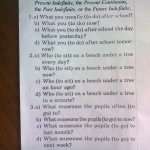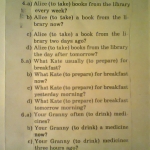Open the brackets. Put verbs into thе Presen Indefinite, Presen continius, Past indefinite, Future indefenite.
5-9 класс|
|
1. What do you usually do after school?
b - What are you doing now?
c - What did you do after school the day before yesterday?
d- What will you do after school tomorrow?
2- Who sits on a bench under the tree every day?
b- Who is sitting on a bench under the tree now?
c-Who set on a bench under the tree an hour ago?
d-who will sit on a bench under the tree in a minute?
3 - what museums do the pupils often go to?
b- what museums are the pupils going to now?
c- what museums did the pupils go to last month?
d - what museums will the pupils go to next week?
4 - does Alic take books from the library every week?
b- Is Alic taking books from the library now?
c- did Alic take books from the library two days ago?
d - Will Alic take books from the library the day after tomorrow?
5-what does Kate usually prepare for breakfast?
b - what is Kate preparing now for breakfast?
c-what did Kate prepare for breakfast yesterday morning?
d - what will Kate prepare for breakfast tomorrow morning?
6 - Does Granny often drink medicines?
b - Is your Granny drinking medicine now?
c - did your Granny drink medicine three hours ago?
1)
a/ What do you usually do after school?
b/ What are you doing now?
c/ What did you do after school the day before yesterday?
d/ What will you do after school tomorrow?
2)
a/ Who sits on a bench under the tree every day?
b/ Who is sitting on a bench under the tree now?
c/ Who set on a bench under the tree an hour ago?
d/ Who will sit on a bench under the tree in a minute?
3)
a/ What museums do the pupils often go to?
b/ What museums are the pupils going to now?
c/ What museums did the pupils go to last month?
d/ What museums will the pupils go to next week?
4)
a/ Does Alice take books from the library every week?
b/ Is Alice taking books from the library now?
c/ Did Alice take books from the library two days ago?
d/ Will Alice take books from the library the day after tomorrow?
5)
a/ What does Kate usually prepare for breakfast?
b/ What is Kate preparing for breakfast now?
c/ What did Kate prepare for breakfast yesterday morning?
d/ What will Kate prepare for breakfast tomorrow morning?
6)
a/ Does Granny often drink medicines?
b/ Is your Granny drinking medicine now?
c/ Did your Granny drink medicines three hours ago?
Другие вопросы из категории
you drop a coin into the water, the coin can be seen clearly at a depth of a hundred feet. Lake Baikal is also the world's largest freshwater lake with one fifth of the Earth's liquid fresh water.
On several trips to Baikal over the past few years, I have come to know the lake, and have listened to many people who live nearby and worry about its future.
It has a special place in the hearts of Russians and is a symbol of beauty. This huge old lake — clear, beautiful, and surrounded by the wilderness of Siberia — is the world treasure but it can only remain so if the world treats it with love and respect.
First lay the mirror in the dish of water at an angle of about 30°. You may need to hold it there with sticky tape. Then fill the dish with water. At this stage place your dish in a strong beam of sunlight so that the light falls across the mirror. Next look around the room for a reflection of white light, not far away you will see a rainbow. Finally try moving the mirror slightly and watch the rainbow move.
а) 1.Анна живет в Лондоне с 1985 года.Она работает в банке. она работает там 3 года.
2.билл всегда хотел побывать в Брайноте . он прочитал много книг об этом курорте .
3.семья браунов еще не выстроила свой новый дом . сколько вресмени они его строят? они строят его уже 2 года.
4.я вас целую вечность не видела . где вы были? где вы прятались? я пишу книгу о своих путешествиях . пишу ее 1,5 месяца,поэтому живу на ддаче с мая.
б) 1.какая сегодня погода в лос-анджелесе? солнечно и тепло . прекрасный день ,чтобы поехать на побережье поплаватьи позагорать .
2.сколько времени идет дождь? дождь идет три дня . на улице ветренно,сыро и облачно . у нас осенняя погода.
3.какая была погода вчера в москве? шел снег,было 10 градусов ниже нуля ,но было солнечно.
с)1.стекло очень хрупкое .
2.мы сожгли старые листья в саду.
3 жара имеет плохое влияние на людей.
4.влияние учителей на учеников велико.
5.ты когданибудь бывал в ораньжерее ?
7.ты чтонибудь слышал о "ПАРНИКОВОМ ЭФФЕКТЕ"?
7.что производит эта фабрика?
8.в северной африке более 4000 часов солнечного света каждый год.
9 на побережье достаточно прохладно,правда?
10. какое влияние имеют климатические изменения на людей?
protest, aggressive, phiosophy,symbol, solidarity
Читайте также
a. This machine (not/work).
b. Hurry. The bus (come). I (not/want) to miss it.
c. The river Nile (flow) into the Mediterranean.
d. The river (flow) very fast today - much faster than usual.
e. (it/ever/snow) in China?
f. We usually (grow) cucumbers and tomatoes in our garden, but this year we usually(not/grow) any.
g. You can take my umbrella. I (not/need) it at the moment.
h. I usually (enjoy) parties. But I (not/enjoy) this one very much.
i. George says he is eighty years old. But I (not/believe) him.
j. Roger is in Paris at the moment. He ( stay) at the Continental Hotel. He usually (stay) at this when he is in Paris.
1. I (to lost) my key. I cannot find it anywhere.
2. You (to eat) many sweets when you were a child?
3. I (to buy) a new car. You must come and see it.
4. I (to go) to the USA last year.
5. Where you (to be) yesterday evening?
6. Lucy (to leave) school in 1999.
7. I am looking for Mike. You (to see) him?
8. You (to be) to Paris? Yes, many times.
9. I’m very hungry. I (not to eat) much today.
10. When this book (to be) published?
1. We hope, that the weather (to be) good tomorrow.
2. She (to buy) a new dress two days ago.
3. Rachel usually (to visit) her grandparents on Saturday.
4. When I (to enter) the room, my parents (to have) dinner.
5. I (to read) the whole evening yesterday.
6. She (not to like) waking up early.
7. Look! The children (to play) football now.
8. I (to do) my homework at 7 o’clock yesterday.
9. Tom (not to come) to the party tomorrow. He (to go) to rugby training.
10. She (to want) to become a part of this team.
Economic Structure
In market economies economic systems are typically subdivided into three sectors. This subdivision (to be based) in part on economic activities pursued and in part on the type of wants satisfied. The primary sector comprises basic activities, the extraction of economic goods from nature: agriculture, forestry, hunting and fishing, though the extraction of minerals frequently (to be assigned) to the secondary sector which comprises handicrafts and industrial manufacturing of goods and certain material services such as fuel and power and the provision of water. Lastly, the tertiary sector (to consist of) all final services: trade, transport, banking and insurance, public services, etc.
In this context it is worth analysing the development of British economy since the British were Europe's first industrial nation.
Anyone who (to study) economics knows that in every country the first resource is land. Densely-populated Britain has not much of it, but until the 18th century England's economy (to be based) on agriculture and the manufacture of woollen cloth. In the late 18th century, the Industrial Revolution (to allow) Britain to become the first industrialized trading nation.
For 200 years manufacturing has been more important, but by the 1970s it (to be) clear the Britain's old manufacturing industries were less progressive than the same industries in other Western European countries. Newer industries, such as car manufacture, were no better than the older ones like textiles. In general, the value of goods produced by a hundred workers had for many years increased much less than in West Germany. In some factories there (to be) not enough new equipment; in others, new equipment was not being used efficiently. Many of the old industries (to be owned) by the state.
After 1979, when Mrs. Thatcher's government (to come) to power the nationalization process (to be reversed), many enterprises (to be sold) off to the private sector. Many plants (to be closed) and in a few years those which survived were no longer needing subsidies. New "high-tech" industries developed. Although manufacturing continues to play an important role, the number of people employed in manufacturing (to fall) by a quarter in 1979-84.
Contrary to the secondary sector, the service industries expanded. More than half of all working people, whether employees or self-employed, are now providing services, working for schools, hospitals, social services, in public administration, in finance, banking, insurance, advertising, catering and entertainment.
Another recent change has been in the growth of self-employment. During the 1980s, the number of people working for themselves, and not as employees, (to rise) by half, from two million to almost three million, or more than one-tenth of the whole working population. This development (to be encouraged) by the government through training courses and tax incentives.
с) Reread the article more carefully and complete the sentences given below, using information from the article.
1. In 1992 ... situation ... difficult.
2. Large macroeconomic imbalances ... in the initial stages of ... economy.
3. ... progress was achieved in ... policies. 4. Real GDP ... by 19 percent in 1992. 5.... fell by 8 percent.
6. The fall in output... factors.
7. The decline in demand followed ....
8. Monthly ... rates ... in January 1992.
9. ... consumer prices ... 2,300 percent.
10. The acceleration of inflation ... policies.
11. Real wages ... of prices.
12. Registered... low.
1. It (to be) November now. It (to get) colder, the days (to get) shorter. It often (to rain).
2. I (to meet ) him when he (to walk) across the park.
 сервис вопросов и ответов
сервис вопросов и ответов
